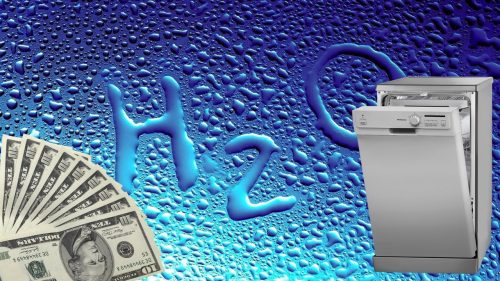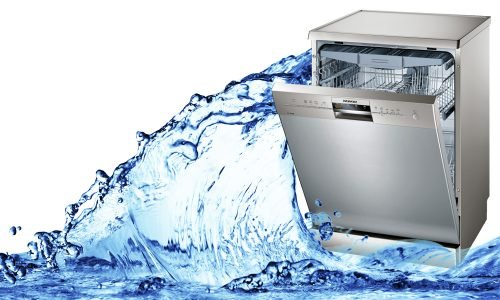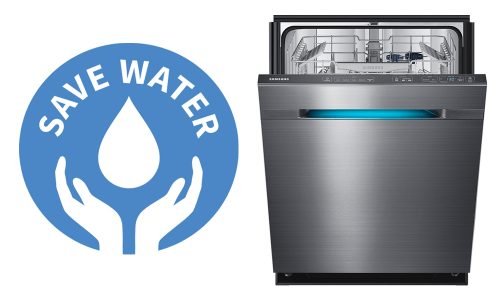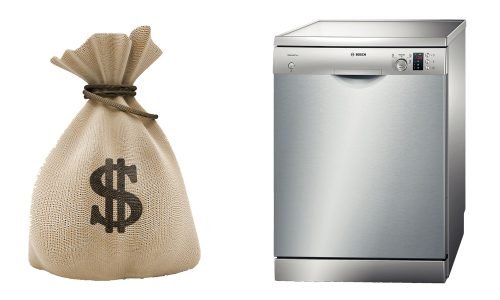
A lot of people erroneously consider dishwashers exclusively as a luxury item and a means of saving time. And only after acquiring it, they say: ‘If I had known that it saved water, I would have bought it much earlier.’ Let’s get a sense of this miracle of technology.
What is the Water Consumption of a Dishwasher?

Of course, it will differ depending on the year of manufacture and the brand. The general rule is as follows: the more expensive a dishwasher is, the less water it consumes. However, no matter how simple or old a dishwasher is, the water consumption per cycle rarely exceeds 20 liters. And most of the latest models generally ‘fit’ in 10.
In many ways, water consumption depends on the selected program and on the degree of contamination of the dishes. To avoid overspending, it is sufficient to soak the dishes with the burnt or sticky leftovers of food for a short time, after which the dishwasher will cope with it even in a cost-effective cycle. How much water does a dishwasher use? Even with a usual consumer grade dishwasher, the water consumption is from 10 liters (cost-effective mode) to 14 liters (intensive mode, it is used extremely rarely). In more expensive brands, these figures are even better.
Saving Water with a Dishwasher

So, just imagine that it is able to wash 10-12 sets of dishes with a bucket of water. And how much water will you need to do it? And this is about 100 liters, ten times more than the consumption of water of the dishwasher for the same number of plates.
Even if you assume that you are a super-economical housewife washing dishes under a thin trickle or in a filled sink, you are unlikely to spend less than 40-50 liters. At the same time, further reduction of water consumption is possible only to the detriment of the quality of washing. Thus, there is saving of water, at least 4-5 times. Each wash cycle saves you from 30 to 40 liters, that is, about a cube of water a month, if you wash the dishes every day.
Expenses on a Dishwasher

Of course, water is the main, but not the only resource consumed by the dishwasher. You still need special products, tablets, rinses… But you also buy all kinds of washing-up liquids and other consumables, protective materials for hand washing. Otherwise, you need to have your nails manicured more often, as your manicure is washed into the sink.
Many people are prevented from buying a dishwasher with the additional power consumption. However, even here, not everything is so unambiguous. Electricity in dishwashers is mainly spent on heating the water. But when you wash the dishes manually, you also do it not with cold water, but with warm water, and in the same way, you pay for this heating. You pay an increased tariff for hot water or pay for gas and electricity to get water heated with a gas water heater or a boiler.
Moreover, with manual washing, you always turn on the light over the sink, which negatively affects the bills for electricity. In addition, the dishwasher spends not so much electricity, as it may seem. Modern dishwashers spend from 0.8 to 1.5 kWh per cycle.
The Dishwasher is Not Only Water Saving
In addition to reducing expenses, the dishwasher has other advantages. The main thing is, of course, saving time and nerves. It is estimated that an average family spends more than 200 hours per year on washing the dishes. This is more than 8 days. And if you divide it into an 8-hour working day, it turns out that this ‘work’ takes 25 days. Families with dishwashers have fewer quarrels because they have no reason for disagreement on the subject of whose turn to wash the dishes it is.
The quality of washing in the dishwasher exceeds one of even the most scrupulous housewives. The secret is simple: high temperature (up to 70 ° C) and highly active detergents. As you understand, the human skin will not be in perfect condition after the contact with such a combination.
The dishwasher can be used not only for its intended purpose. I remember, after purchasing it, my wife, washed all the dishes in the house in her joy, and she was eager to find something else to wash. She washed gas hobs, the grilles of the hood fan, our refrigerator shelves… Fortunately, she managed to stop, but many people go even further and wash vegetables, combs, rubber boots and even children’s toys in dishwashers.
Thus, the dishwasher is a wonderful thing in all respects. Is it a bit too expensive? I agree. However, it will pay off in spades in 3-4 years (the higher your water tariff is, the faster it will happen). At the same time, it will begin bringing pleasure and saving your time and nerves from the first day after the purchase.
